From the Director
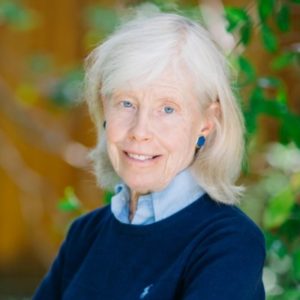
I write this at a moment of extreme challenges for almost everyone I know and care about: family, friends, colleagues, and staff; the Center on the Legal Profession and all of its supporters; the legal profession itself; and those most adversely affected by the pandemic and systemic racism. Have I left anyone out? Not intentionally. So this will not be the cheery Director’s column that is customary in such newsletters. What follows is my best effort at some slight silver linings.
One is that the issues on which the Center has traditionally focused have never seemed more relevant: access to justice, diversity and inclusion, regulatory reform, and leadership. That last topic especially seems so crucial, as we are watching the presence and absence of good leadership play out in real time with millions of lives and livelihoods at stake. The third edition of my casebook Leadership for Lawyers came out in February, and already requires a supplement.
It is likely all of the Center’s programming will be online for the foreseeable future, which will make it cheaper and easier for people to attend. I have already been involved in planning or participating in conferences and webinars on topics such as crisis leadership, stress management, and related topics. And the Center is planning a virtual fall conference with thought leaders on legal education that will focus on issues that have become increasingly urgent in recent months, such as reforms in accreditation standards, financing, distance learning, bar exams, and racial diversity and inclusion.
We are also busy working on research and white papers on the urgency of regulatory reform and access to justice. Here I quote from an article in press by my colleague David Engstrom on “The Post Covid Courts America Deserves.”
“As with so much else in American life, Covid delivered a gut punch to our justice system. Courthouses were abruptly shuttered, cases suspended, and trials postponed. But in truth, our courts were already in crisis—chronically underfunded, increasingly politicized, behind the curve technologically, and shockingly out of touch with the justice needs of ordinary Americans. And it is here that Covid’s ravages might offer the thinnest of silver linings, or at least an opportunity to make things right. As Chief Justice Bridget Mary McCormack of the Michigan Supreme Court put it on a recent panel hosted by the American Law Institute, Covid “is not necessarily the disruption we wanted, but it’s the disruption we needed.”
The Center will be participating in debates about how to reform court processes and bar ethical rules, how to jump-start innovation, and how to harness technology in ways that help those who need help most. And we will working on ways to better train lawyers for the enormous leadership challenges that lie ahead.
We look forward to your ideas and support, and hope that you and your loved ones remain safe and well.
DEBORAH L. RHODE
Ernest W. McFarland Professor of Law Director
Center on the Legal Profession
Center Celebrates 10th Anniversary with Focus on Access to Justice
In honor of the Center’s 10th anniversary, Stanford hosted a convening on October 30 and November 1, 2020 – to focus attention on access to justice and the strategies that might address it.
The event began with a distinguished panel on a key question: “Can Changing Legal Services Regulation Increase Access to Justice?” The panelists—Utah Supreme Court Justice Deno Himonas, Legal Services Corporation President James Sandman, and Arizona State Law Professor Rebecca Sandefur— agreed that changing bar regulation structures was a critical strategy to making justice available, not just in principle but in practice.
Professor Deborah Rhode, the moderator of the panel, recalled President Carter’s observation four decades ago that we are “overlawyered and underrepresented.” It is even truer today. The United States has one of the world’s highest concentration of lawyers, but one of the least effective systems of making services available to those who need them most. Our nation ranks 99th out of 128 countries on access and affordability to civil justice, Rhode pointed out, and “the profession’s own regulatory rules are more part of the problem than the solution.”
Professor Sandefur, a recent MacArthur Foundation “genius” award winner, framed the issue as a set of fundamental paradoxes in American democracy. “Ordinary people,” she said, “elect representatives to write laws that are supposed to order fundamental things like family life, housing and employment. But then they can’t use those laws because they are too complex.” The key problem to be solved seemed to be “people’s access to their own law.” And solving this problem, Sandefur suggested, would not just reduce hardship and increase well-being, but also “shore up democracy.”
Sandefur pointed out that in many other countries, non-lawyers can deliver legal advice, and researchers find that the advice is as good or better than that provided by lawyers. In perhaps the most comprehensive such study, conducted in the U.K., nonlawyer experts were more likely than lawyers to offer excellent assistance.
As Professor Sandefur put it: “people who need help can’t get it because of the fear of the unauthorized practice of law,” An example was a community organization that was helping a victim of wage theft and then found itself the subject of a bar complaint of unauthorized practice of law (UPL). Not only could such bar enforcement activity prevent recovery of unpaid wages, it might also chill efforts to organize low-wage workers to prevent employer exploitation.
Justice Deno Himonas emphasized the “need to act thoughtfully and decisively” to promote regulatory reform. His experience spearheading court-led reform efforts in Utah suggested three lessons. First, he pointed to the “exponential increase in demand” for legal services from individuals, small and medium-sized businesses that put pressure on courts, law schools and others to rethink delivery channels for legal advice. Second, he emphasized the importance of the building momentum for change, and building on insights from those who are already experimenting with reform. Finally, he warned that regulatory reform and increased use of technology are not silver bullets. Rather, he emphasized the need to reassess “all channels for delivery of legal advice” and “fundamentally rethink” who could provide such advice. He compared the lawyers’ current monopoly on legal advice as the equivalent of allowing “only thoracic surgeons to deliver any kind of medical care.”
James Sandman, president of the Legal Services Corporation and former managing partner of Arnold and Porter, emphasized that our legal system was in crisis and failing millions of people every year. Multiple studies over the last decade find that over four-fifths of the legal needs of low income individuals remain unmet, and that about three quarters of the cases in state courts have at least one unrepresented litigant. “We need solutions that are commensurate with the magnitude and urgency of the problem, and we are not going to get there without significant change,” Sandman urged.
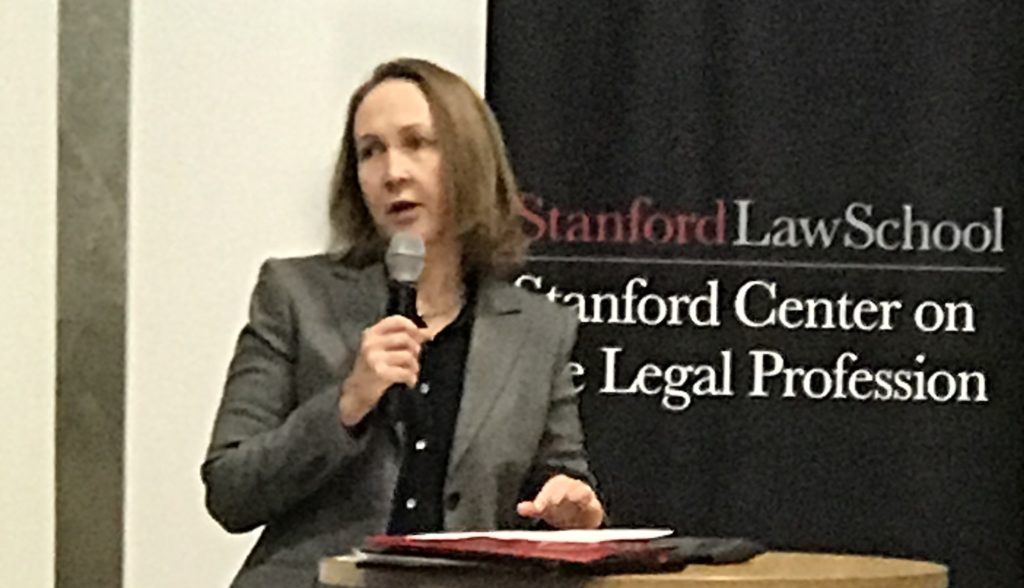
Dean Jenny Martinez welcomes judges, lawyers and non-profit leaders to the November 1 convening on regulatory reform, and talks about the work of the Center on its 10th Anniversary.
Sandman advocated a three-pronged approach consisting of “vastly more legal aid funding,” process simplification, and regulatory reform. Sandman pointed out that the amount of civil legal aid funding in the U.S. is less than what people spend on Halloween costumes for their pets. But he also acknowledged that there will never be enough money for a legal aid lawyer for everyone with a legal problem, and not enough pro bono hours to fill the gap. To meet the needs of unrepresented litigants, we need to “simplify and rethink court processes.,” Sandman also denounced the bar’s enforcement of unauthorized practice rules in the name of “consumer protection,” when the real objective is lawyer protection. People should have access to trained nonlawyers for routine needs.
Sandman also argued for “liberaliz[ing] the rules around ownership and capital investment in law.” Bans on fee sharing with non lawyer partners discourage innovation. To make change happen will require leadership from the judiciary, in part to “wrest control of the regulatory process from lawyers.” Sandman closed his remarks by asking: “Where is the outrage? Why do we continue to tolerate a status quo that is unacceptable?”
To extend the impact of this panel, the Center worked with the Stanford Journal on Civil Rights and Civil Liberties to publish a symposium on access to justice, based in part on two of the presentations at this panel. Professor Sandefur’s essay documents the substantial unmet consumer demand for legal advice, and the research showing that trained nonlawyer providers can provide assistance on routine needs that is as good or better than what lawyers provide, and at lower cost. Justice Himonas, together with his clerk Tyler Hubbard, describe the work of Utah’s forward-thinking state supreme court seeking to “democratize the rule of law” by offering online dispute resolution, allowing licensed nonlawyers to provide limited legal advice, and experimenting with nontraditional legal service providers through a regulatory “sandbox.”
The symposium also included two other essays. One focused on the challenges and opportunities for improving pro bono work among in-house counsel, coauthored by Deborah Rhode, the Center’s former Executive Director Lucy Ricca, and the Director of Stanford’s Pro Bono and Externship Programs and Lecturer in Law Michael Winn. A second essay by Margaret Hagan, the director of the Legal Design Lab, and Lab Fellow Daniel Bernal proposed a new design framework for innovation on access to justice. They suggest synthesizing “expert-oriented” and “humancentered” approaches, and draw on the lessons from a case study on providing legal information to unrepresented litigants in Arizona eviction cases. Taken together, these four essays demonstrate the range of strategies necessary to make justice more available to those who need it most.
Regulatory Reform Moves Forward in Several States with the Center’s Help
In the past year, several states – led by Utah, Arizona and California – have been considering changes to the rules that govern the legal services market, and the Center on the Legal Profession has played a key role in these efforts. The Center’s 10th Anniversary convening brought together judges, bar leaders, nonprofits, and executives from legal technology companies. The convening kicked off with a panel (see page 1) featuring Utah Supreme Court Justice Deno Himonas, President of the Legal Services Corporation Jim Sandman, Professor Rebecca Sandefur, and moderated by Professor Deborah Rhode. Other attendees included ABA President Judy Perry Martinez, Arizona Court of Appeals Judge Maria Elena Cruz, outgoing Arizona Chief Justice Scott Bales, and President of the National Center on State Courts Mary McQueen.
Participants shared the Center’s commitment to reforming regulation of the legal services market to better promote innovation in legal services and access to justice. The aim of this convening was to better understand and map out the work necessary to build support for such changes. By the close of the event, participants agreed on several areas that required focus: engaging with stakeholders, including lawyers and judges; broadening engagement outside the legal community; drawing lessons from research on regulation and consumer protection in other nations and other occupations; and developing better communications aimed at lawyers, courts, legislators, and the public. The Center committed to working with other national organizations to coordinate these efforts going forward. We also launched a Policy Lab in the winter quarter to engage students, and enlist them in preparing a set of white papers on issues related to this work. In April, we released the first of these white papers, “How Reforming Rule 5.4 Would Benefit Lawyers and Consumers, Promote Innovation, and Increase Access to Justice.”
In the last few months, the Center has played a major role in the California State Bar’s consideration of the recommendations from its Access Through Innovation in Legal Services (ATILS) task force. The task force recommended a set of changes to the Rules of Professional Conduct that not only govern the behavior of lawyers, but also define who, what and how legal services can be offered. Those recommendations include consideration of allowing licensed paraprofessionals to providing designated legal services, much like nurse practitioners in medicine. The Center submitted comments in November supporting the task force recommendations, and Jason Solomon spoke at the March meeting when the recommendations were considered and largely approved.
Consideration of the final recommendation in the task force report – to explore a regulatory “sandbox” that would relax the limits that Rule 5.4 places on lawyers’ ability to partner with nonlawyers in owning or investing in legal service providers – was delayed by the State Bar’s Board of Trustees until the May meeting. In the run up to that meeting, the Center played a critical role in building support for the sandbox recommendation. We drafted a letter from nearly 20 California legal ethics professors urging the Bar to move forward with the sandbox recommendation, and Deborah Rhode and Jason Solomon published an op-ed in Law.com/The Recorder titled “Access to Justice During Covid-19,” which explained the urgency of regulatory reform in helping expand access to legal services to individuals and small businesses affected by the pandemic. CLP Advisory Forum member Ralph Baxter and former Utah Bar President John Lund also published an op-ed before the vote urging the Bar to move forward. The Center helped coordinate the submission of comments in advance of the meeting for people around the country, and a set of speakers for the meeting itself, resulting in a 7-2 vote in favor of the sandbox recommendation.
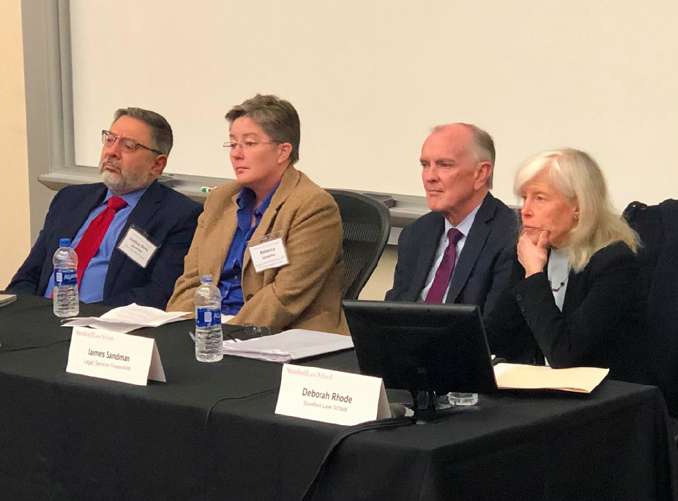
Utah Supreme Court Justice Deno Himonas, Professor Rebecca Sandefur, Legal Services Corporation President Jim Sandman, and Professor Deborah Rhode discuss regulatory reform as a means of increasing access to justice on the Center’s 10th anniversary.
The Center also played a role, largely through the work of Fellow and former Executive Director Lucy Ricca, in the launch of the Utah Supreme Court’s Office of Legal Services Innovation, which will oversee their sandbox effort. Utah is considering applications to the sandbox under expedited review from nontraditional legal service providers who want to offer low-cost or no-cost legal services to help those affected by Covid-19. We also submitted comments to the Arizona Supreme Court in support of their task force’s recommendations to repeal rule 5.4 altogether, and were pleased that the Arizona Bar Board of Governors voted to support that recommendation in May.
This work furthers one of the Center’s key missions: to promote laws and policies that ensure that the legal profession serves the public interests, not just its own.
Programs on Gender Issues
In February 2020, the Center hosted two events on gender issues: one focused specifically on women leaders in law, and the other reflecting on the #MeToo, and its implications for the profession and the public. Although women constitute nearly 40% of lawyers, they account for only 19% of equity partners at large law firms, and are grossly underrepresented in other leadership positions. To help understand why, the Center joined with the student group Women of Stanford Law to ask a panel of lawyers “Why Aren’t There More Women Leaders in Law?” and to discuss what to do about it.
Advisory Forum member David Sanford, Chairman at Sanford Heisler Sharp, spoke about his work bringing gender discrimination claims against law firms He talked specifically about the way that “origination credit” formulas often unfairly disadvantage women, and the problematic “black box” nature of compensation decisions at most firms. Sanford also discussed strategies to help level the playing field, such as providing part-time attorneys with a path to partnership.
Two female leaders on the panel talked about their own career paths and what can help other women replicate their success. As a team leader, Lora Blum, General Counsel for SurveyMonkey, emphasizes open communication and appreciation for everyone’s work. For example, she encourages her team to take advantage of parental leave, and not worry about being perceived as insufficiently “committed.” Blum took full advantage of parental leave when she had her own children. In talking openly about this, she found that the women and men on her team were more comfortable doing the same.
Emily Lam, a partner at Skadden and the head of the firm’s Silicon Valley office, acts as a resource for others who are less well-positioned to voice their concerns. Although she could not recall personally experiencing gender discrimination, she has made a priority of assisting others who have. Lam has also welcomed the recent push by general counsels to insist on more diversity in their outside counsel, as it helped strengthen like-minded voices within firms.
On February 17, the Center partnered with the nonprofit Legal Momentum to consider the question “#MeToo: Why Now? What’s Next?”. President and CEO of Legal Momentum, Carol Baldwin Moody, noted that “protecting women’s and girls’ rights begins with the law,” but also requires placing more women in leadership positions.
Speaking in the middle of the Democratic presidential primary, Celinda Lake, a leading pollster and expert on women’s issues, noted the barriers for women running for high political offices, especially the presidency. “Women are dropping out at a much faster rate than men, and are having a harder time raising money and getting endorsements,” Lake pointed out. Women in public life are treated with particular hostility on social media, she observed, citing the negative campaign launched against Elizabeth Warren and the attacks on two women of color leaders in the Culinary Workers Union in Nevada.
Top to bottom: Lora Blum, Chief Legal Officer & Secretary .SurveyMonkey; Emily Lam, Partner, Skadden, Arps, Slate, Meagher & Flom LLP and Affiliates; David Sanford, Chairman and Co-founder, Sanford Heisler Sharp, LLP.
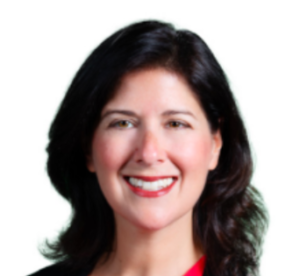
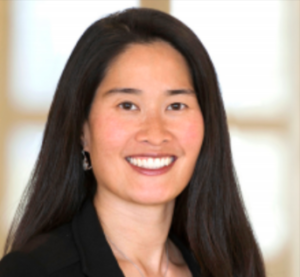
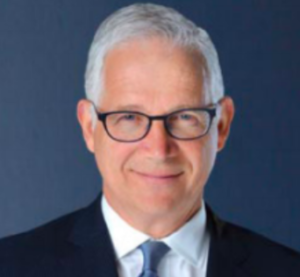
Leading pollster Celinda Lake discusses the treatment of women in public life as Deborah Rhode listens as part of the panel “#Metoo: Why Now? What’s Next? “.
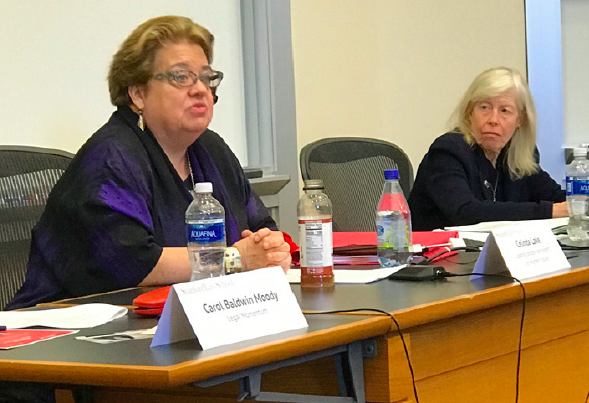
Professor Deborah Rhode highlighted the shift in language around sexual harassment, thanks to the #MeToo movement. While she was in college, there wasn’t even a term, let alone a remedy for “sexual harassment. Students had a “problem” with their professor, and the problem was always theirs, not his. In today’s culture, social media have been part of the problem and solution. Women are disproportionately vilified and threatened on line, but they are also able to challenge abuse directly and sometimes effectively.
Online technology has “enabled women to bypass unresponsive legal processes and human relations offices and go straight to the public.” An example is Susan Fowler, the former Uber engineer whose supervisor propositioned her the first day on the job. Despite her evidence of screen shots of the harassment, HR officers told her that he was a “high performer” with no other history of complaints. When Fowler found out that was not true, she quit and told her story online. Her post went viral, promoted an outside investigation led by former Attorney General Eric Holder, and toppled the careers of twenty executives.
Rhode cited other examples of constructive self-help in the legal profession. One included a prominent law firm that had failed to do due diligence before making a lateral hiring offer to a partner with a substantial book of business, along with a history of gender complaints confidentially resolved. On his first day at the new firm, a large bouquet of flowers arrived with a card signed “Thank you for taking him. The women.” The firm did an investigation and he was gone within a week.
Finally, Lynn Hecht Schafran, Director of the National Judicial Education Program to Promote Equality for Women and Men in the Courts, outlined the challenges still present in how judges deal with sexual violence cases. Victimizing the victim is still common. Schafran also criticized the American Law Institute’s (ALI) adoption of a definition of consent for the Model Penal Code that allows for the consideration of the absence of physical or verbal resistance. Advocates had previously succeeded in removing this factor from legal doctrine. Despite the successes of the #MeToo movement, Schafran highlighted the low number of people reporting rape cases, the uncooperative and abusive manner in which officers often respond to those allegations, the ways in which prosecutors treat the cases, and jurors’ frequent skepticism of rape victims.
What's Ailing Lawyers?
In recent years, the legal profession has started grappling more openly with problems of mental health and substance abuse that plague its members.
On February 18th, the Center hosted journalist Eilene Zimmerman, author of the new book Smacked, and Patrick Krill, an attorney and licensed alcohol and drug counselor who advises law firms, to discuss these issues with an audience of lawyers and law students. Zimmerman’s book centered around the sudden death of her ex-husband, a partner at Wilson Sonsini, and her discovery after his death of his struggles with substance abuse, an issue she previously wrote about for The New York Times. When the medical examiner first suggested that he died of an overdose, Zimmerman recalled, she could not believe that a high-achieving professional like her ex-husband could be a drug addict.
But after his death, Zimmerman set out to learn more about the issues of mental illness and substance abuse in the legal profession and among other high-status professionals. She posted on message boards, and heard from hundreds of lawyers and other professionals with feelings of depression and anxiety.
Zimmerman noted that through the responses, it was clear that the demanding culture and nature of the legal profession was harmful to attorneys. She quoted a lawyer at a small firm in the Southeast who explained that since he was expected to respond at all hours, it was easier to just work all the time.
Krill pointed out that there has been important progress made at law schools and law firms in the last five years, and offered that we “may be on the precipice of meaningful change.” Data has helped open up the conversation, Krill observed, and tragedies among lawyers have hit the headlines more than in the past. Krill described the recent research showing that attorneys have higher rates of substance abuse, depression and anxiety than other professionals, and a lower rate of willingness to seek help than other professionals. The data also showed that those in the first ten years of practice are at higher risk. But at both law firms and law schools, there are signs that help is both more available, and people are more willing to seek it.
Why are lawyers in worse shape than other professionals? Zimmerman suggested that the billable hour might be to blame, but Krill suggested that the issue goes beyond that. Both agreed that the 24/7 expectation of availability – fueled by technology — was a key contributing factor, with not enough time to recharge. One lawyer told Zimmerman that the lack of mentoring for less experienced lawyers was a problem as well, in that young lawyers lacked guidance for how to manage competing demands on their time. Krill also referred to lawyers as “the loneliest profession” with much opportunity to isolate and little opportunity to share feelings and make social connections. An audience member who coaches lawyers pointed to the combination of high expectations and low agency as a “toxic combination”; lawyers feel like they cannot control their time, a problem particularly bad among associates.
Krill discussed the work of the National Task Force on Lawyer Well-Being, on which he served, and its 2017 report that led to thirty-three statewide task forces focusing on the issue. Krill was also the architect of the ABA Well-Being Pledge, which had accrued 176 signatories at the time of the panel, and gives legal employers a step-by-step framework for better supporting their people and hopefully reduce the frequency of people who struggle with these issues. The ABA has also launched an anti-stigma campaign with testimonials from lawyers and judges talking about how they got help.
At both law firms and law schools, there are signs that help is both more available, and people are more willing to seek it.
These efforts and others are aimed at making cultural changes within firms and in the profession more broadly. Some of those changes are around being more willing to seek help; others are around some of the practices of overwork that lead people to seek relief in alcohol or drugs. For example, Zimmerman pointed out that expecting all lawyers to genuinely take vacation, and all new parents (men and women) to take parental leave, would go a long way in setting new norms around work/life balance.
The panel also discussed another important set of norms: those around reaching out to people who seem to be struggling. Professor Rhode expressed concern about a study of law students where one out of three students said that even if they noticed a classmate struggling, they would not do anything. Zimmerman also expressed frustration that her ex-husband’s colleagues did not step in and encourage him to get help when they saw his erratic behavior, but the panel acknowledged that norms within the profession were not to get involved in what was perceived as other people’s business.
There is also the question, of course, of what to look for as signs that someone is struggling. As part of Zimmerman’s journey, she went back – and discusses in her book – to think about what signs she missed of her ex-husband’s drug addiction. Krill suggested at a high level “changes in the person” as what to look out for and more specifically, changes in mood, deterioration in appearance, or changes in overall performance as reason to reach out for a “care and concern conversation.” Krill explained that many lawyers know they have a problem, but fear making a change because they have often managed to be functional with the help of substances.
Though Zimmerman expressed hope that the next generation of lawyers will insist on change in how lawyers work, and Krill pointed out that these are “solvable problems,” the panelists also recognized that some of the proposed solutions might impact firm profits and therefore be difficult to get traction.
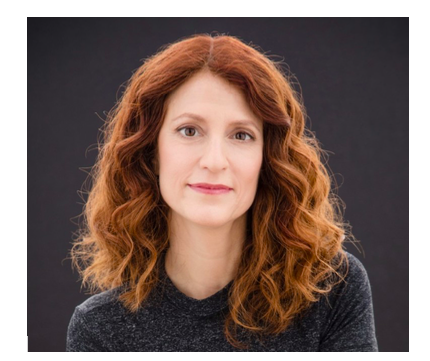
Eilene Zimmerman
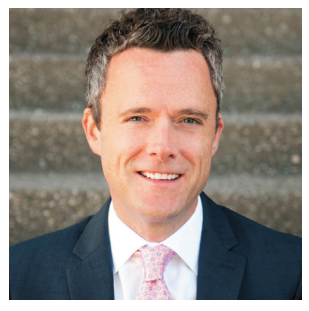
Patrick Krill
Legal Design Lab Promotes Greater Access to Legal Information
The Legal Design Lab continued its valuable work in building a better legal Internet, and using technology and design frameworks to increase access to justice.
In January, the Lab hosted a convening at Stanford to explore how technology companies can work with nonprofits and courts to make sure that individuals get better legal information on the Internet. Representatives from Google, Reddit and Apple/Siri shared ideas about what they would need in order to identify the most trustworthy sources of information, and increase its accessibility to consumers. Ohio Supreme Court Chief Justice Maureen O’Connor and National Center for State Courts President Mary McQueen shared thoughts as well, and this discussion helped accelerate collaboration around these issues
Evictions have been a primary focus of the Lab’s access-to-justice work, and that focus has deepened this year. Margaret Hagan and Jason Solomon co-taught a 2-quarter course on “Justice By Design: Evictions” which attracted a committed group of undergraduate, graduate, and law students. Students went through the design process, understanding eviction from the tenant-user perspective and working in small teams to build prototypes. After getting feedback from experts and users the teams worked with external partners such as the San Jose Mayor’s office, California Judicial Council, and the nonprofit Tenants Together to design products or services that would make the eviction process better for tenants. For example, the Tenants Together team designed a text message-based method of doing intake to their hotline in order to better triage and target help. The Lab has also launched a national partnership with the National League of Cities to work with mayors on eviction, based in Left: Students in the D-School/Law School course “Justice By Design: Evictions” listen to feedback from a housing expert on their project presentations. Right: Margaret Hagan outlines the Lab’s “design approach to legal services innovation” to eviction experts. part on the Lab’s work in Ohio and Arizona.
These two lines of work — building a better legal Internet, and access to justice — came together during the Covid-19 crisis. With millions unable to pay their rent, but many states and localities passing moratoriums on evictions, the Lab partnered with Pew Charitable Trusts to get people the highest-quality, most accurate information on eviction laws and regulations . The Lab built out a Legal Help FAQs platform from scratch, with the initial version focused on key questions for tenants about eviction, rent, utilities, court hearings, and repairs during the pandemic. The approach was to direct renters to key information in their jurisdiction and then refer them to local public interest groups for greater assistance. The site was specifically designed to direct search engines to the site for questions on housing issues for COVID-19.
Left: Students in the D-School/Law School course “Justice By Design: Evictions” listen to feedback from a housing expert on their project presentations.Right: Margaret Hagan outlines the Lab’s “design approach to legal services innovation” to eviction experts.
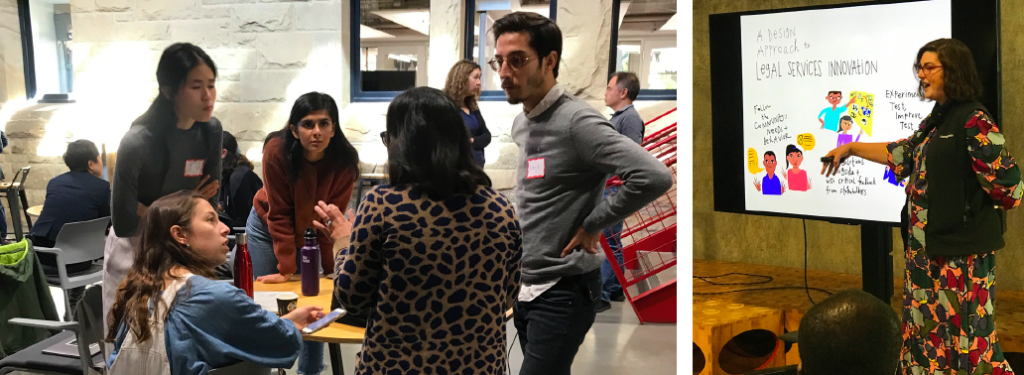
The Lab has also signifcantly influenced developments in the regulation of the legal services market (see page 2). The idea of using design principles in the policy realm – explored at a Stanford conference the Lab hosted last year – has taken hold in legal services regulation. Last year, Margaret Hagan and Lab fellow Jorge Gabriel Jimenez published an essay advocating regulatory “sandboxes” to allow experimentation with nontraditional legal services providers. The Utah Supreme Court was convinced and launched its sandbox in May 2020. Margaret continues to be involved in the Utah effort. California may follow suit.
Finally, the Lab was able to secure a 2-year, $1 million grant from the Hewlett Foundation and additional support from the law school. This funding is both an important supplement to that from our firm partners Faegre Drinker and Orrick, as well as our partnerships with legal-aid organizations, and also allows the Lab to expand its reach by hiring a head of Policy and Design. A few months ago, Nora al Haider joined us from Amsterdam, where she was working on legal design and open-government issues, to take on this role. As part of this additional funding, the Lab will now be an independent Center at the law school, a tribute to Margaret’s tremendous work. And of course CLP will continue to partner with the Lab on access-to-justice issues and other projects.
Law Firm Leaders Share Challenges with Students
On May 21, Hailyn Chen, the managing partner of Munger, Tolles and Olson, and Advisory Forum member Steve Lowenthal, the former managing partner of Farella Braun Martel, joined Deborah Rhode’s class on Leadership for Lawyers to share insights about leading law firms.
Chen and Lowenthal each started showing leadership as young lawyers through various committee and programmatic work. They also developed leadership skills through volunteer work outside the firm as well. For Chen, being on the Board of the Girl Scouts of LA was particularly valuable, because she was passionate about the organization and saw how women led meetings. Lowenthal urged students to get involved with community activities outside the law, but also pointed to his work with bar associations as good for building his practice long-term. “ It has to be enjoyable,” he emphasized.
As managing partners, Chen and Lowenthal faced common challenges. Chen pointed to the difficulties of leading a business where “your primary assets walk out the door every night.” Lowenthal made a mistake “early and often” in trying to find solutions that made everyone happy. “Sometimes that’s not best for the firm,” and you need to use your judgment, even if it makes people unhappy. Hopefully you’ve done the necessary work of listening and engaging, he added, so that people see the other side of the issue.
They also faced certain different personal leadership challenges. As a woman of color, Chen did not benefit from the presumption of competence that older white male leaders enjoy. She had to build credibility and demonstrate competence in order to be taken seriously as a leader. Even now, she bumps up against race and gender bias. Last year, when Chen attended a meeting of about 400 managing partners from around the country a year ago, almost all the participants were white and male. Several people asked if she was someone’s wife, or even whether she was a lawyer.
Lowenthal confronted challenges based on his youth. He had to manage people who were older, more accomplished, set in their ways, and “didn’t want me to screw things up.” He made sure to include these partners in the process for big decisions, show them respect, and understand their perspectives. And more generally, he tried to build credibility through “a lot of listening,” and leading by example.
As a woman of color, Chen…had to build credibility and demonstrate competence in order to be taken seriously as a leader.

Lowenthal confronted challenges based on his youth…he tried to build credibility through “a lot of listening,” and leading by example.
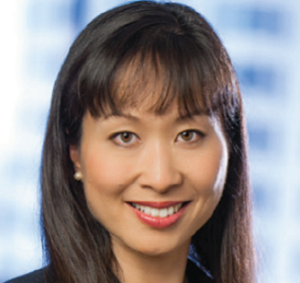
Hailyn Chen
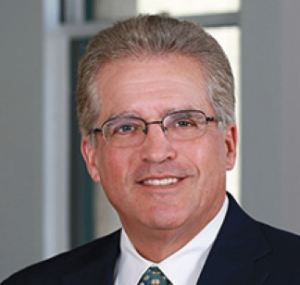
Steve Lowenthal
Chen and Lowenthal also described challenges arising from economic conditions. Lowenthal had experience with the 2008 recession. Chen is coping with the current pandemic. Lowenthal stressed the importance of a unified culture and vision, and the need to balance partners’ demands for profitability and other stakeholders’ desires to avoid layoffs. Chen pointed out that if the firm’s values are all about growth and revenue generation, then it becomes difficult to motivate people in a downturn. “You need a broader vision and goals to give people a reason to look out for one another and ground decision-making,” Chen explained.
Students asked about firm policies and practices around issues of concern, such as whether associates have to work on cases (or for clients) they find controversial. At Munger, the firm will sometimes discuss as a firm whether to take on certain clients or matters, and even if they do take it on, people can opt out of working on that matter. Farella is “generous” about letting attorneys not work on certain cases, though even with controversial clients, attorneys may want to work on interesting legal issues.
Chen, who started at a big law firm as the mother of two young kids, believes in supporting parents with generous leave policies. But she also pointed to the need to counteract “benevolent bias,’ where a woman gives birth and returns to work, but a partner declines to ask the woman to travel to a trial or deposition so as not to burden her. Munger pays for backup child care so that women can take on these assignments if they choose.
Experts Put Impeachment in Context
At two critical points in the impeachment process, the Center hosted events with leading experts to put the events in context for students and the public.
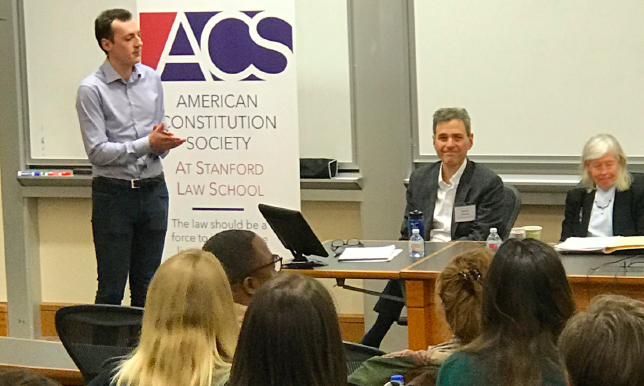
Benjamin Mercer-Golden, Co-President of the American Constitution Society, introduces Professors David Sklansky, Deborah Rhode, and Jack Rakove (not pictured) at the October 2019 panel on impeachment.
In the fall of 2019, as the House began impeachment proceedings, faculty panelists—Professors Jack Rakove, Deborah Rhode and David Sklansky—discussed the legal, institutional, and historical context that is the backdrop for impeachment. The October 14 event drew a full house, spilling into a nearby overflow room.
Professor Rakove, a historian who won the Pulitzer Prize for his book on the original meaning of the Constitution, explained the origins of the impeachment clause, which the founders debated the clause in the last week of the Convention, and originally defined the grounds for impeachment narrowly as “treason and bribery.” After George Mason proposed the much broader “maladministration” as the standard for impeachment, Madison proposed “high crimes and misdemeanors”—a term going back in English history to the 14th century—as a compromise.
In the final analysis, Congress has the power to determine what acts justify impeachment. In making that determination, Rakove argued that the historical context of presidential elections ought to matter – that is, the more confidence we have in the electoral process, the less we should rely on impeachment in removing a president. When the acts of corruption themselves involve the electoral process, however, then use of the impeachment mechanism is particularly appropriate.
Professor Rhode recalled her time working as counsel to the House Judiciary Committee during the impeachment proceedings against President Bill Clinton. She noted that politicians then and now are just concerned with what’s going to make them look good.” She noted that although she knew impeachment was a political process, she was not prepared for just how politicized it was in the “age of polarization.” No one in either party cared about the standard of “high crimes and misdemeanors,” Rhode observed, it was “all about spin, not about substance.” Although she had been asked to join the committee as an expert in ethics and gender discrimination, it was clear that the proceeding was less about supporting discrimination victims, and more about unearthing information of Clinton’s extramarital affairs. In both Clinton’s and Trump’s impeachment proceedings, Rhode pointed out, members of Congress took positions based less on the public’s interests than their own. Although this is a natural survival strategy for politicians, Rhode suggested that at a moment when the country’s future is at stake, one could hope that at least some might rise above self-interest.
Professor Sklansky pointed out the flaws in the analogy that the president and his supporters were drawing between Trump’s impeachment proceedings and the criminal process, saying the analogy was “all wrong.” For example, the Sixth Amendment right “to be confronted with the witnesses against” you only applies to criminal trials, not criminal investigations or civil proceedings. He acknowledged that during the Nixon and Clinton impeachment inquiries, the House did hold public hearings, and the president’s lawyers had some right to cross-examine witnesses. But he pointed out that given the threats the president made against the whistleblower and other such witnesses, it was quite reasonable that the House had conducted its investigation behind closed doors thus far.
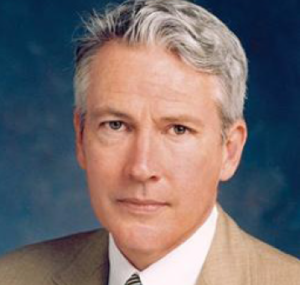
Philip Bobbitt
In January 2020, Professor Philip Bobbitt of the University of Texas gave the Center’s annual Distinguished Lecture in Leadership, in an event co-sponsored by the Constitutional Law Center, the Federalist Society, and the American Constitution Society. Bobbitt is the co-author of the highly regarded Impeachment: A Handbook, newly revised, framed his lecture as about “the present impeachment, and its meaning for the future of the constitutional order.” He began by dispelling some myths and arguments currently being made in the public sphere.
Bobbitt noted that impeachment was not a political process but a legal proceeding, pointing to the constitutional requirements of a Senate trial and an oath by Senators to “do impartial justice according to the Constitution and laws.” Bobbitt resisted the idea that the President needs to have committed a crime to be impeached, and provided historical and textual context for the term “high crimes and misdemeanors.” Following “treason” and “bribery,” the term must have something in common with those offenses. Based on the constitutional history, Bobbitt argued that it was “an act against the proper functioning of the State itself.”
Seen in that light, the House’s charge of “abuse of power” was both appropriate and on strongest ground when it focused on the refusal of the president to disburse Congressionally authorized military assistance without a political favor from Ukraine, which provided the “corrupt motive for this constitutional violation.” Bobbitt considered these actions the “core” of an impeachable offense: “a blatantly unconstitutional act motivated by a corrupt agreement or attempted agreement with a foreign power to influence an American election.” Bobbitt added that interfering with Congressional appropriations “struck at the heart” of our constitutional order, which is predicated on the spending power residing in elected representatives who face the voters every two years.
Defending While Black
Professor Ron Tyler, head of the Criminal Defense Clinic, moderates a January 30 discussion with some of the leading chief Public Defenders from around the country, including Derwyn Bunton (Orleans Public Defenders) and Martesha Johnson (Nashville Defenders), co-sponsored with the Criminal Justice Center.

Center Exposes 1Ls to Federal Litigation in a Global Context
On January 15, the Center hosted a panel for the entire 1L class where alumni discussed their work on transnational litigation. This panel was a part of the required “Federal Litigation in a Global Context” course, where students write briefs and do mock oral arguments as part of a simulated course. A few years ago, the law school changed this simulation to a transnational context as part of an effort to better prepare students for global legal practice. The Center organized this panel as part of its mission to connect students and the profession.
Most of the panelists began their practice without any particular interest or background in issues of transnational law. But they each explained how they found themselves dealing with transnational litigation, either representing U.S.-based companies with lawsuits against foreign individuals or companies, or representing foreign individuals or companies with matters in U.S. courts.
With the students getting ready to work on a forum non conveniens motion, the panelists discussed how to argue about whether a case should be in a U.S. court or overseas. Maya Perelman ’16, an associate at Keker and Van Nest, represented Genentech against a Taiwanese company that had allegedly stolen the formula for Genentech’s biologics, protein-based drugs. The threshold issue was “Could we haul this Taiwanese corporation into the Northern District of California?” Perelman framed the issue as one of justice and patriotism: “These employees stole thousands of documents and snuck away to another country and started a company based on imitation of drugs—after our client put in decades of R and D—and this is an important company to the Bay Area, which makes these groundbreaking cancer drugs. You should care about this.”
Another way to argue for U.S. jurisdiction is to point to the inadequacy of the overseas forum. Jordan Elias ’03, a partner at Girard Sharp who brings class actions and other mass torts, made such an argument while representing Chinese families in wrongful death lawsuits from an airplane crash, where the airline was Chinese and the engine manufactured by General Electric. When Elias brought the lawsuit in San Mateo Superior Court, the judge stayed it on forum non conveniens grounds. Elias and his colleagues moved to lift the stay, saying that China is an inadequate forum. When the San Mateo County judge denied the motion, Elias appealed on the ground that the totalitarian regime was not going to hear these claims, but the appellate court indicated that China was a country “in transition,” but not necessarily an inadequate forum.
Alex Reese ’11, partner at Farella Braun Martel, described the challenge of representing a British company in U.S. litigation. Although so much of the foundation of the U.S. legal system is from Britain, the way that litigation happens in the U.K. is very different. “So we had to step back from how we usually talk to our U.S. in-house counsel,” Reese explained. The CEO of this small company was a very “hands-on” client as well, and was outraged by standard U.S. litigation practices like the defendants filing a motion to dismiss for failure to state a claim. “They know what they did!” the CEO complained. The U.S. deposition process was also very unfamiliar to them, so Reese had to prepare witnesses for the unpleasant experience of sitting in a windowless room all day answering questions. In the UK, the “loser pays” default rule means that litigants do not have as much incentive to drive up the other side’s costs.
Finally, the panelists discussed the challenges of thinking through how a U.S. jury will perceive people or cases from other countries. Perelman, for example, had a case where the government of Australia sued her client on a patent case in the Eastern District of Texas, and she had to think through how Australians would appear to a Texas jury. Gilat Bachar JSD ’18, who worked as a Fellow at the Center for Justice and Accountability, described a Torture Victim Protection Act trial against a former Somali military commander in the Eastern District of Virginia where her side had to lay out in their opening statement why this case was in the U.S. “We said that here in America, we do not tolerate torture. Even if it happened in another country, this person [the Somali commander] lives in Virginia, and the laws of the U.S. do not tolerate that,” she explained.
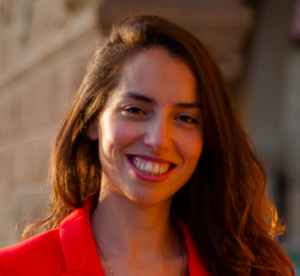
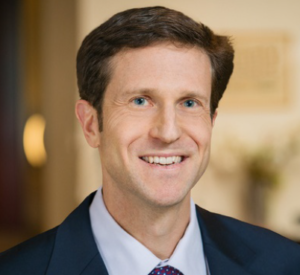
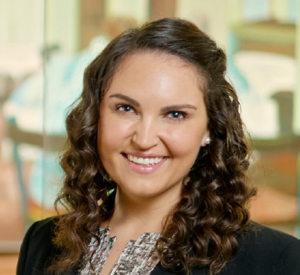
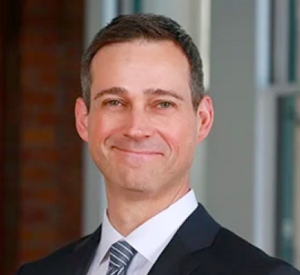
Top to bottom: Gilat Bachar JSD ’18, Jordan Elias ’03, Maya Perelman ’16, Alex Reese ’11.
Outreach 2019-20 Academic Year
Deborah Rhode, “Prosecutorial Ethics,” National Association of Former U.S. Attorneys (NAFUSA) conference, San Francisco, September 2019
Margaret Hagan, Legal Services Corporation’s ITCon speaker, Portland, January 2020
Deborah Rhode, Lawyer 2 Lawyer podcast, “Legal Ethics and the Profession”, January 2020
Margaret Hagan, National League of Cities Conference speaker, Washington D.C., March 2020
Deborah Rhode, Clarke Prize Legal Ethics CLE on “Ethics, Risk, and Compliance in Business”, Gonzaga Law School, April 2020
Deborah Rhode, CodeX FutureLaw podcast, “Regulatory Reform to Increase Opportunity and Access in the Justice System”, April 2020
Margaret Hagan, Law Technology Now podcast, “Design & the Law”, April 2020
Deborah Rhode, All Rise podcast, “Law and Leadership in a Time of Global Crisis,” June 2020
Deborah Rhode, AALS Section on Leadership webinar, “Leadership Lessons from COVID 19 to Black Lives Matter: A Discussion on Lawyers Leading in Crisis,” July 2020
Center on the Legal Profession Advisory Forum Members:
Ralph Baxter, Former Chair, Orrick Herrington & Sutcliffe
Mark Chandler, Senior Vice President and General Counsel, Cisco
Gordon K. Davidson, Partner, Fenwick & West
Tom DeFilipps, Partner, Covington & Burling (chair of West Coast Corporate Practice group)
Steven E. Fineman, Managing Partner, Lieff Cabraser Heimann & Bernstein LLP
Ora T. Fisher, Vice-Chair, Latham & Watkins
David J. F. Gross, Partner, Faegre Drinker Biddle & Reath (member of firm’s Board)
Michael Headley, Managing Principal, Fish & Richardson
Steven R. Lowenthal, Partner, Farella, Braun & Martel (former Managing Partner)
Julie Jones, Chair, Ropes & Gray
Katharine Martin, Chair, Wilson Sonsini Goodrich & Rosati
David Sanford, Chair, Sanford Heisler Sharp
Mitchell Zuklie, Chair, Orrick Herrington & Sutcliffe
Center on the Legal Profession Faculty Steering Committee:
Nora Freeman Engstrom, Professor of Law and Deane F. Johnson Faculty Scholar
Robert W. Gordon, Professor of Law
Deborah R. Hensler, Judge John W. Ford Professor of Dispute Resolution and Associate Dean for Graduate Studies
Lawrence C. Marshall, Professor of Law, Associate Dean for Clinical Education, and David and Stephanie Mills Director of the Mills Legal Clinic
George Triantis, James and Patricia Kowal Professor of Law


